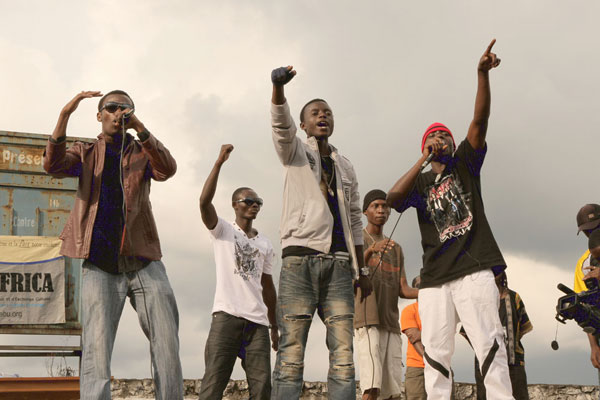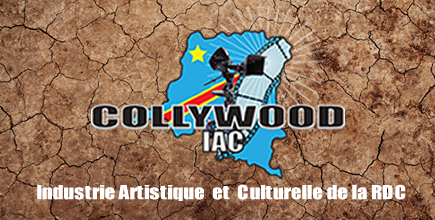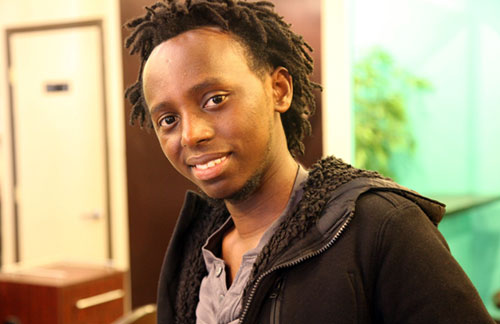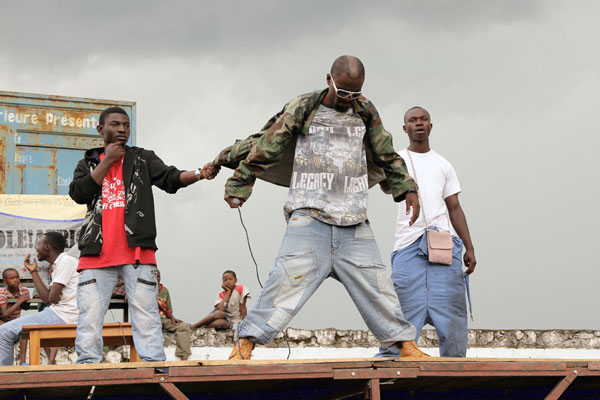
Talent competition at SKIFF 2010 (photo by Thomas Gesthuizen)
Situated on a lake shore, the foot of an active volcano (actually, two volcanoes), the border with Rwanda and on the southern edge of North Kivu province, the city of Goma has been in the middle of several of humanitarian and geological crises, most notably the Rwanda genocide (1994), the eruption of Nyiragongo (2002), the eastern Congo wars (1996-2003) and most recently activities of various groups of rebels, including M23, a rebel group whose headquarters are located a stones throw from the provincial capital. The latter have been held partly responsible for the use of rape as a weapon in their conflicts with the Congolese army. In November they launched an attack on Goma, taking over the city without much resistance from the national army.
Among accusations of being backed by the Rwandan government (the incorporation of the resource rich Kivu provinces into the Rwandan economy has been more than just imagination), M23 was called into peace talks and within weeks the rebels were on their way out, leaving a trail of looted houses, raped citizens, over 1100 escaped prisoners hiding among the population and a pillaged central bank. All this happened thousands of kilometers from Congo’s capital of Kinshasa. The day M23 marched into Goma, this video from Kinshasa-based rapper Lexxus Legal’s child education album ‘5eme Doigt‘ was launched, and the bouncy castle, computer graphics and celebrating kids couldn’t be more of a contrast to the image that western TV screens showed of Congo that same day:
To the outside world, not much changed in the perception of Eastern Congo since we last wrote about it. The recent saga with M23 didn’t help in providing a balanced image of daily life in Goma. In the past two years a number of insightful documentaries and books have been published in the west about eastern Congo, but most of them still focused on conflict, and nearly all were authored by westerners.
The fact that Goma has a budding cultural scene has gone largely unnoticed by the rest of the world. Companies creating opportunities for young talent include the Maisha Soul studio, run by the brother of Congolese pop idol Innos’B, radio stations aiming at the youth of eastern Congo like Mutaani, the Yole!Africa youth center, UJADEP (Union des Jeunes Artistes Dessinateurs et Peintres), Maison des Jeunes and Maison Proplusion. There are organizations working to strengthen the budding local film industry like Collywood (yes, the name is for real!), Goma Film Project and in the past couple of years a number of new recording artists and music video producers have emerged.

Geographically isolated from Kinshasa, and still a four-hour drive from the Rwandan capital Kigali, artists from Goma don’t have many official avenues to promote their work. The city is the capital of non-governmental organizations (NGOs) though: nearly every western and Congolese aid organization has an office (or rather: a barbed wire fenced compound flanked with watch towers) in Goma, and some of them have provided substantial budgets for workshops or support of local cultural initiatives.
Not surprisingly, the most visible output of the local artistic community has been through events or projects organized by these NGOs, and often the topics of these songs are restricted to the issues that they want to promote. The presence of these NGOs is not necessarily the best catalyst for the development of an independent, self-sustaining arts scene, or civil society as a whole. Sekombi Katondolo, founder and CEO of Mutaani project: ‘Most NGOs ask artists to write about their activities like against cholera, malaria and so on. It doesn’t mean this message is not welcome, but musicians should realize that this is music for food, they should not stay artists for NGO’s; they should say what they believe.’
So is there any hope for local artists to grow their market without being dependent on NGO funds? Sekombi: ‘Yes, we have to bring different events together and have the people of Goma pay for it. We have one million people living in Goma, if one artist sells his album for one dollar (the cash used most in eastern Congo is the American dollar, ed.), that means we can get 200,000 US dollar with a good marketing team. I think the most important thing is to start thinking that money is here and we can make money ourselves, not until western NGOs give it to us’.
Both Maisha Soul Studio and Mutaani were founded by young people who received their training at Yole!Africa, a cultural center founded in 2000 by internationally renowned filmmaker and activist Petna Ndaliko Katondolo. Yole!Africa organizes the annual Salaam Kivu International Film Festival, which is the largest cultural event in eastern Congo and operates outside of influence of NGOs. Yole!Africa has stood by its conscious decision not to rely on development funding to organize this event. Instead, since the first edition of the festival in 2006, Yole!Africa has had financial backing from Alkebu Film Productions and through this has managed to grow an audience of thousands of Goma youth by working with private financial and in-kind contributions from organizers and volunteers, and most importantly by involving the community, getting them to organize events on their own terms.
Video: Salaam Kivu All Stars – Saisir l’avenir, created in a video production workshop during SKIFF 2010
When Yole!Africa was founded it was the only operational cultural organization in the region and consequently faced tremendous difficulties including working with limited budgets in an environment with virtually no support from local authorities. During the organization’s early years, staff and workshop participants were regularly harassed by police when filming outside the Yole!Africa compound. In short, Yole!Africa went through many difficult times to pave the way for other cultural organizations to take root in the region. Even now, as Yole!Africa just celebrated its 10th anniversary, the organization is still perceived as a threat for its commitment to autonomy. Indeed, just last year the center was violently robbed several times by unknown men in local police uniform who stole valuable equipment, a case which according to some was fueled by government fears that the center continues to grow as a dissident voice in society.
Today, local government and NGOs are excited to work with Yole!Africa, but the organizers do not always accept financial contributions from anybody: ‘We don’t want to become a program for the NGOs, if there is money we want it to develop what we have already put in place.’ As the cultural pioneer of the region, Petna is wary of the negative effect development money can have on creativity and self-reliance among artists. ‘NGOs have money, they are hiring artists to sing what they want. Musicians become like agents of propaganda, instead of writing what they feel, they write what other people want to hear. NGOs have had this impact since 1994 when Rwandese refugees came to Goma to escape the genocide.’ Another problem that Yole has faced is the attitude that the presence of NGO money has created in the community. NGOs in Goma sometimes provide per diem payment for workshop participants, and youth attending classes at the youth center were expecting the same – get paid to learn!
But, according to Petna, there is a way for artists to benefit from working with aid organizations without becoming puppets of development: ‘I have told artists: don’t let NGO money buy your soul. Get that money, ask enough so you can produce three of your own songs, or make one film for them and produce your own videos afterwards. Some of the artists managed to adopt that system. Fonkodji is one of them, he has since started his own record label and he’s now capable of hiring services of artists to help him to make his own songs. Also he produces for the outside world, including churches and NGOs or even politicians when they want to do their campaigns.’
Eric Fonkodji is the brother of Innos’B (real name Innocent Balumé), who had a national breakthrough when he won the Vodacom Superstar competition in 2010 at the age of 12, performing a cover of a Michael Jackson song. The outcome of that victory for Innos’B included a Vodafone sponsoring contract, shows all over the country and national superstar status. Also it created an opportunity for the young singer and his two musician brothers to develop their label and perform and record outside the country. At the time of writing, Innos’B, Prince Aghakan and Fonkodji were in Atlanta (USA) working on Innocent’s debut album featuring the likes of Akon and Ludacris, while Fonkodji is also recording new tracks for his own album.

Eric Fonkodji
All these opportunities have been quite exceptional for young artists hailing from Goma. Back home, Fonkodji has continued to develop his studio, producing for hip hop artists but he also launched an initiative called Zoomzik in an effort to unite musicians in learning about ways to improve their arts and business. To Fonkodji, lack of local radio and tv support has been one of the major challenges: ‘In Goma we have a media problem, journalists don’t mingle with musicians. The media in Kinshasa are far away and they don’t know what is happening in Goma because our country is in disorder. Kigali (Rwanda) is nearby but I don’t think they are very interested in our music. We do have local TV in Goma, but they are not professional and they don’t promote local musicians. I want to start my own tv station focusing on culture so that we artists will have a base.’

S3 performing at Salaam Kivu International Film Festival 2010 (photo by Thomas Gesthuizen)
We wrote before about the Salaam Kivu festival which we attended in 2010 to host a video production workshop in which a group of students shot and edited a music video (embedded above) for a track recorded by artists that won a rap and singing competition during the festival. The Salaam Kivu All Stars project was followed up in 2012 with the installation of Yole’s Beat Making Lab and the recording of ‘Cho Cho Cho‘, a posse cut which ended up on ‘Celebrate Nations’, an international compilation released on the occasion of the 2013 the Africa Cup of Nations.
One of the role models for many aspiring hip hop artists in Goma and someone who also performed at SKIFF 2010 was S3, a rapper based in Goma. His stage shows introduced the artist as a kind of demi-god, but it was his energetic performance that got the crowd on his side with ease as he delivered strong messages in French and Swahili. Regarded among his colleagues as one of the more achieved local hip hop artists, S3 had previously recorded a couple of promotional tracks but because of lack of distribution opportunities most of his claim to fame was based on live shows and word of mouth, until recently.
The beginning of this year saw the release of ‘Je vote’ (I vote), the first music video by S3. Last year, the song itself won the third prize in Fair Play’s Anti Corruption Youth Voices Award and in November S3 got to present his work in Brazil. He is one of the local artists who signed a promotion and distribution deal with the brand new Mutaani record label, a side project of the radio station with the same name. In Congo, community radio stations are not allowed to run commercial advertizing, so Mutaani has had to look for alternative sources of income and the label is one of them. Mutaani have signed six artists for their first string of EP-length releases to be launched on 8 March, made available internationally via iTunes. The other artists on the Mutaani label are JC Kibombo, Yvonne Fatuma, Wanny S King, Detty Darba and DJ Coco.
S3 explains: ‘I am working on a full album with 16 songs. For the past six months I have been recording in different studios, in Goma at Mutaani and even in Kigali (Rwanda) at F2K. In the Kivu region we don’t really have a market for full albums so I previously released only singles and EP’s. The full album, called Legitime Defense, will be split into two volumes – the first will be about protecting our country and the second one talks about the rights of the voiceless in society’.
S3 has been working in an environment known to the world as a war zone, but he doesn’t see the war as the single biggest obstacle to his career as a musician. ‘In Goma we don’t live at war permanently, there are times when everything is quiet and that is when everybody is doing what they do best – we musicians come out and send a message to our leaders demanding peace’. The emcee takes the potential impact of his music very seriously: ‘For me, music is the most effective weapon, it can be used to change society. Even if bad luck knocks on our door, I will keep my head to the sky. We work hard for the country and its people. We already got used to poverty, hunger and war itself, but we won’t give up the struggle because there are voices that are still unheard, and it’s through our lyrics that the message will come through.’
S3 is critical about the benefits of working for NGOs: ‘They may study our music to see how they can make us work for them, then they will decide what subjects we must talk about in our lyrics. Forget about issues that I want to sing about such as protecting human rights or incompetent leadership, they don’t want to hear that at all. I don’t see how development organizations will benefit my music, I rather stay independent. You know, without the war in eastern Congo there won’t be many of these NGOs left so let us not depend on them to make our dreams come true’.
Links
The next edition of Salaam Kivu International Film Festival will be from 5 to 14 July 2013, keep an eye on their Facebook page.
Mutaani is streaming live via Mutaani.com
Check out the Balume brothers via Soundcloud or Innos’B’s Facebook page
S3 has a webpage for his Music Hall Company


